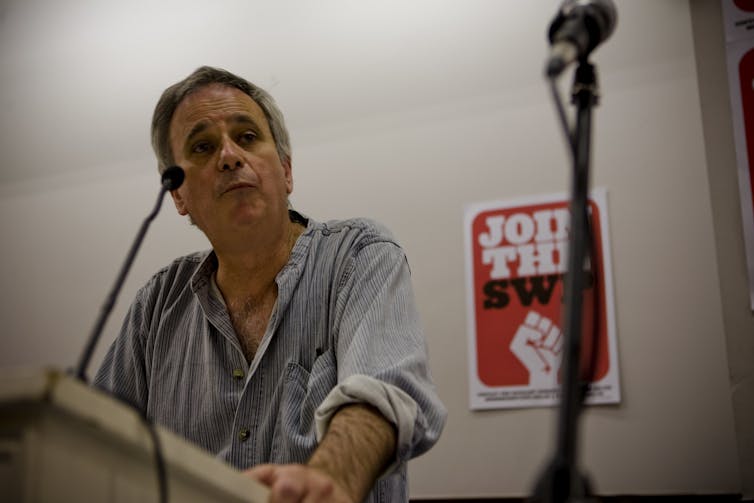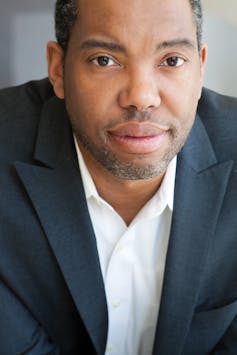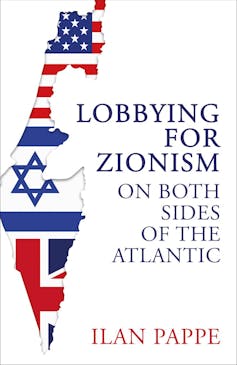Last May, on a trip to the United States, world-renowned Israeli–Jewish historian Ilan Pappe was detained by Homeland Security and held for two hours.
Aged 69 at the time, he was, among other things, asked about his views on Hamas and whether Israel’s actions on the Gaza Strip amount to genocide (he said yes). He was then asked to provide phone numbers of his contacts in the Arab–American and Muslim–American communities.
In December, months after his interrogation by Homeland Security in the US, Pappe was removed without explanation from the BBC podcast, The Conflict, about the Middle East on the day he was supposed to record his contribution.
Review: Lobbying for Zionism on Both Sides of the Atlantic – Ilan Pappe (One World)
Pappe is one of Israel’s “New Historians”, who look for the truth about the 1948 Israeli “war of independence”.
The war began when Israel declared its independence following the partition of Palestine. Though it was quickly recognised by the US, the Soviet Union and other countries, it was immediately attacked by Egypt, Iraq, Lebanon, Syria and Jordan. When the war ended in July 1949, the new state controlled one-fifth more territory than the original partition plan, to which it refused to return.
Palestinians mourn the 1948 war as the Nakba: their violent mass displacement and dispossession. (It created about 750,000 Palestinian refugees.)
One of the world’s most prominent scholars of the entwined histories of Israel and Palestine, Pappe is an urgent advocate of Palestinian rights and author of a groundbreaking 2007 book on the formation of the state of Israel, The Ethnic Cleansing of Palestine.

His latest book, Lobbying for Zionism on Both Sides of the Atlantic, seeks to understand how a pro-Israel lobby has formed, both in his country of residence, the United Kingdom, and in Israel’s most powerful and ardent supporter, the US.
Pappe’s book is worth heeding: he is both a scholar of the Israel lobby and a recent victim of its attempt to deplatform pro-Palestinian perspectives.
An ‘aggressive’, anxious lobby
This is the story of an “aggressive” lobby that eagerly seeks to stamp out narratives of Palestinian dispossession and suffering – in case they legitimise Palestinian claims for statehood, or attract sympathy for Palestinians’ lack of political and civil rights in the Occupied Territories.
This lobbying force began in the 19th century and took on more concrete forms after 1948. Much of Pappe’s book is devoted to parliamentary lobby groups, such as Labour Friends of Israel (LFI) and Conservative Friends of Israel (CFI) in the UK, and the American Israel Public Affairs Committee (AIPAC) in the US. The latter spends considerable resources ensuring the US government aligns with Israeli objectives.
In this book, Pappe argues the aggressive Israel lobby is beset by anxiety. Few other states are so keen to “convince the world and their own citizens that their existence is legitimate”.
On the anniversary of the October 7 Hamas attacks, Guardian columnist Jonathan Freedland, whose mother was born in Israel, wrote:
To most outsiders, Israel is a regional superpower, backed by a global superpower. It is strong and secure. But that is not how it looks from the inside. Israelis see their society as small – the size of New Jersey – besieged and vulnerable.
Explaining this discrepancy, he wrote that while Israel is “a state with a daunting military”, on October 7, Israeli Jews felt “powerless as their ancestors in the shtetl”.
When Pappe writes about the Israel lobby, he is not describing a monolithic entity, but multifaceted “groupings of ideas, individuals and organisations”. When he speaks of the Zionist lobby, he means individuals or groups spreading pro-Israeli propaganda, while seeking to discredit anyone “condemning or criticising Israel or Zionism”. But these groups change their composition, orientation and methods over time, Pappe writes.
His book tells a story of organisations and “committed” individuals who, from the 19th century on, worked to convince policymakers and governments of the need for a Jewish homeland.
Colonialism and apartheid
From the early 20th century, Zionism has adapted to contemporary circumstances. It presented itself as a movement for national self-determination, fitting a “minority rights” model.
Pappe draws on the work of Palestinian–American critic and activist Edward Said to argue Zionism increasingly allied itself to the story of Western modernity and progress. In doing so, he argues, it helped perpetuate Orientalism: a Western understanding of the Arab and Islamic Middle East as underdeveloped and backward.
From the late 19th century, Palestinians were perceived as “at best, an exotic spectacle and, at worst, an ecological nuisance”, Pappe writes. Recently, US President Donald Trump has dismissed Palestinians’ connection to the land in Gaza, calling it a “big real estate site”.
As antiracism has become a cultural norm in the West, Israel, like other nations, has become wary of comparisons to apartheid South Africa. However, those comparisons have existed for a long time. In recent decades, the Israel lobby has amplified claims of antisemitism as a defence against them, “weaponising anti-Semitism to procure public support for Israel”, Pappe argues.
Israel had a close military alliance with apartheid-era South Africa, before the anti-apartheid African National Congress came to power in 1994. Last year, South Africa argued at the International Court of Justice in The Hague that Israel is responsible for apartheid against Palestinians.
In a searing account, Pappe charts an intensive campaign by the Israel lobby against former UK Labour leader Jeremy Corbyn, who called for the immediate recognition of a Palestinian state.
The newspaper The Jewish Chronicle, for example, accused Corbyn of associating with “Holocaust deniers, terrorists and some outright anti-Semites”, he writes. Corbyn stepped down in 2019.
In 2020, a report by the UK Equality and Human Rights Commission (EHRC) found the culture within the Labour Party under Corbyn “at best, did not do enough to prevent anti-Semitism and, at worst, could be seen to accept it”.
Antisemitism in the UK Conservative Party gets much lighter treatment, Pappe argues. For example, former frontbencher Jacob Rees-Mogg described Jewish members of his party as “illuminati who are taking power to themselves”. Pappe believes the reason for this discrepancy in treatment is that Corbyn was in a position of power “that could affect British policy towards Israel”.
The lobby and the US
In the book’s second half, Pappe shifts his attention to the US, now Israel’s major geopolitical sponsor. He argues the US is intent on exempting Israel from any reckoning with international law.
He details the emergence of the American Zionist Emergency Council, a forerunner of AIPAC that emerged in the 1950s. These organisations’ early successes included US recognition in 1947 of the UN’s Assembly Resolution 181, which called for the partition of Palestine into Arab and Jewish states, with Jerusalem as a separate, internationally governed entity.
This led to the 1948 Arab–Israeli war, which ended with an enlarged and consolidated state of Israel. Rapid US recognition of the new state was another early success for the lobby. Signature achievements include the constant flow of arms and aid to Israel. Another is the US using its position on the United Nations Security Council (and its power and influence more generally) to enable Israel to avoid complying with numerous UN resolutions.
However, Pappe shows the lobby has by no means always had its way. Since its inception, it has come up against the more sceptical, “pro-Arab” US State Department, which employs Middle East experts who are more sympathetic to its various populations. There have been periods of friction with Israel, including in the 1950s, when the US temporarily suspended economic aid.
Lobbying strategies developed since the 1950s are noteworthy. If the US executive branch of government wavers on unconditional support, the Israel lobby cultivates the Congress. In the UK, the lobby curries favour with MPs in the Labour and Conservative parties, including organising trips to Israel through allied groups, such as Labour Friends of Israel and Conservative Friends of Israel.
In the US, AIPAC funds the campaign of pro-Israel candidates and holds lavish conferences, high on pomp and display, at which legislators and politicians (including Trump, former president Joe Biden and former vice president Mike Pence) profess their identification with Israel.
The lobby vs civil society
Pappe argues that the lobby’s cultivation of political elites threatens to widen the gap between political and media elites on one side, and global civil society (trade unions, churches, academic associations, non-government organisations, and activist groups) on the other. We can certainly see this happening today against the backdrop of the current war in Gaza.
In recent decades, dissent over Israel’s actions has also increased within the US Jewish community. A significant segment of the Jewish diaspora is reasserting itself and its progressive values, derived from the Jewish experience of victimisation and statelessness, in relation to Israel.
Pappe draws attention to the emergence in 1996 of Jewish Voice for Peace, which calls itself “the largest progressive Jewish anti-Zionist organization in the world”, and the liberal Zionist lobby J Street, which works towards a democratic Jewish homeland in Israel, with a negotiated resolution, agreed to by Israelis and Palestinians.
J Street wants to normalise Israel as a democratic Jewish state committed to a two-state solution, and is uncomfortable with Israel as an occupying power. In its own words, it “rejects any proposal to have Israel and the United States forcibly displace the people of Gaza and/or occupy the Strip”.
Pappe notes that active support for the Boycott, Divestment, Sanctions (BDS) movement is strong in UK civil society. Perhaps this is due to Britain’s postcolonial guilt, after enabling the creation of the state of Israel before then largely vacating the diplomatic field. The UK Israel lobby, which is frequently given voice in the Murdoch media in particular, consistently attempts to align antisemitism and criticism of Israel in the public consciousness.
Disenchanted up close
Despite its current influence, Pappe does not think the lobby’s future as a political force is necessarily guaranteed.
Throughout the book, he insists the Israel lobby is driven, at its heart, by his country’s lack of ethical foundations. As a careful historian, he tellingly believes most of the lobby’s efforts are at war with truth itself.
The Israel lobby, for example, likes to present supporters of the rights of Palestinians as antisemitic. But in fact, they are typically driven by a sense of injustice at the Palestinians’ occupation, and an understanding of their struggle for civil and political rights.
Of course, that’s not to say antisemitism doesn’t exist. And it can exist alongside criticisms of Israel. As Dennis Altman wrote last year, “the passions aroused by Israel’s escalating response to the Hamas attacks have revived centuries-old stereotypes of Jews as both alien and all-powerful” and sometimes “the distinction between opposition to Israel and hatred of Jews becomes blurred”.

But the ranks of the disenchanted have included former US President Jimmy Carter and John Lyons, global affairs editor of the ABC and a former Middle East foreign correspondent. Lyons reflected in his book, Balcony Over Jerusalem, on once being “exposed to all the myths pushed by Israel’s lobby groups”. Now, he is a vocal advocate for the rights of Palestinian people, after covering the conflict at close quarters.
For African American writer Ta-Nehisi Coates, a May 2023 trip to Palestine opened his eyes to a system he compared to both apartheid and America’s Jim Crow South.
No more plucky underdog
There can be no more talk, Pappe suggests in the final chapter, of an Israeli plucky underdog David, fighting for its life against an Arab Middle Eastern Goliath. Of course, this talk has sustained many of Israel’s supporters since the Holocaust. It relies on a conception of Jewish people as actual or potential victims, regardless of evolving power dynamics.
One of the world’s most respected Holocaust historians, Israeli-American Omer Bartov, warned in November 2023 of “genocidal intent” increased by dehumanising political rhetoric, in Israel’s actions in Gaza.
South Africa’s prosecution of the case of genocide against Israel and recent initiatives by the International Criminal Court to arrest Israeli Prime Minister Benjamin Netanyahu are further signs the international “shield” that protects Israel from its “violations of justice and humanitarian law” has serious cracks in it, as Pappe argues in the book’s afterword.

In a January interview with Al Jazeera, Pappe described events of the past 15 months as “an attempt by a new leadership of Zionism to complete the work that they started in 1948, namely of taking over officially the whole of historical Palestine and getting rid of as many Palestinians as possible”.
He believes Israel’s military supremacy will increasingly rely on the “extreme right of the Global North”, including the Trump administration, as well as authoritarian and dictatorial regimes in the Global South.
As Israeli colonialism, suppression of the Palestinians and military activity to depopulate Palestinian areas intensifies, Pappe believes Israel will be almost entirely abandoned by what remains of progressive civil society and the educated intelligentsia, including renowned scholars of genocide whose reflections and warnings we should heed. I agree.
It is important Pappe’s book is not ignored, and that we clearly see the Israel lobby’s challenge to free expression and solidarity with the oppressed.
Ned Curthoys does not work for, consult, own shares in or receive funding from any company or organisation that would benefit from this article, and has disclosed no relevant affiliations beyond their academic appointment.
This article was originally published on The Conversation. Read the original article.







